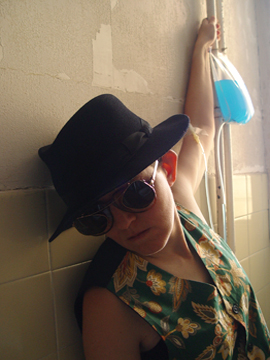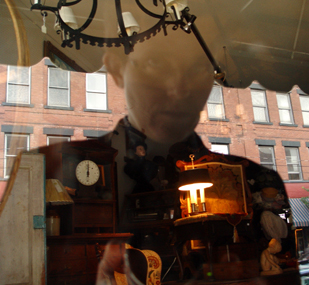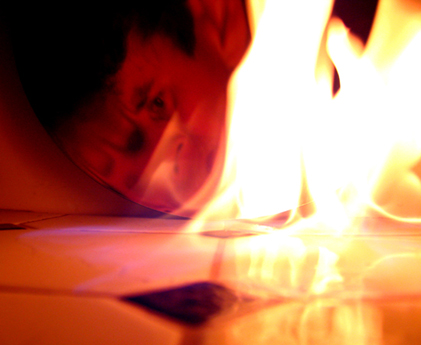Camera Query
is
María DeGuzmán
and
the
collaborators
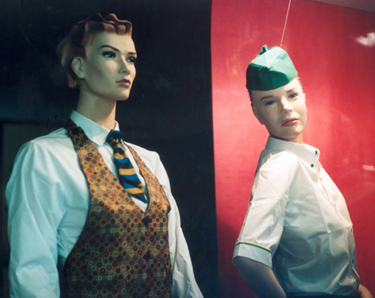
Duty & Sass © 2003 by María DeGuzmán
QUEER/LGBTQ SITES
Atlanta
Pride
¿Arte
queer en España? (Spain)
Barbara
Hammer Films
Bint el Nas (Daughter of the People)
Colombia Diversa (Colombia)
Bending la luz © 2004 by María DeGuzmán
Experimental Performance Institute
The
Fabulous Pages
Frameline
GALA Visual Arts
Gay and Lesbian Arabic Society
Gender
Advocacy & Education
The Gender Frontier
Intergeneration:
Queer Community Across the Ages
International
Queer Hotlist
Jon
Sims Center
LarryBob Hotlist
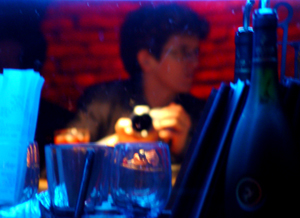
Berlin Bar © 2003 by María DeGuzmán
Lesbenseiten
(Germany)
Lesbian
Cyberspace Index
The Lesbian & Gay Studies Project
Letra S (Mexico)
Movimiento Gay Revolucionario (Venezuela)
National Gay & Lesbian Task Force
National Youth Advocacy Coalition
North Carolina Pride Parade & Festival
The
Other Queer Page
Project QueerLit
queer-arts.org
www.queerculturalcenter.org
Queer
Resources Directory
Queer Theory.com
Queer
Visualities
Radical5 (Montreal, Canada)
Raíz
Diversidad Social (Perú)
[r]Evolution
of Gender
Sexual Minority Youth Assistance League
Simeon Solomon Research Archive
SONG (Southerners on New Ground)
South Carolina Gay & Lesbian Pride
Shadow of a Gender, © 2004 by María DeGuzmán
Miel: Honey Bear Mystic © 2003 by María DeGuzmán
Would you fling a heart of glass? © 2003 by María DeGuzmán
Dream of accompaniment ©2003 by María DeGuzmán
If you would like more information about Camera Query, would like to exchange ideas or chat with María about photo-text work, collaboration, and/or the uses of visual/verbal media, or would like to invite her to give a lecture on her photo-text work at your institution, please write to the following e-mail address:
Five languages are understood: Spanish, English, French, Portuguese, and Italian though replies will be made in Spanish or English
Please bear in mind that, unless otherwise indicated, all photo-text is copyrighted to María DeGuzmán. None of it may be reproduced, copied, projected, or used in any way without written contractual permission granted by María DeGuzmán of Camera Query.
Culture & Copyright Sites
Electronic Frontier Foundation
Webmistress:
María DeGuzmán
María DeGuzmán is Professor of Latina/o Literature(s) & Culture(s) in the Department of English & Comparative Literature at the University of North Carolina, Chapel Hill. She is also the Director of Latina/o Studies at UNC. She has published many articles on Latina/o writers. Her first book titled Spain's Long Shadow: The Black Legend, Off-Whiteness, and Anglo-American Empire was published in 2005 by the University of Minnesota Press. Her second book, Buenas Noches, American Culture, was published in 2012 by Indiana University Press. Her research and teaching include transcultural and comparative ethnic studies, visual culture studies, queer studies, and aesthetics including the study of soundscapes.
Memory cemetery © 2003 by María DeGuzmán
Memory fragment © 2003 by María DeGuzmán
OBSESSION "the persistence of an idea in the mind, haunting" !En los archivos negros, no!
Render the present past, or how do you know which is which, anyway? What is past for some is prologue for others. For me, every moment contains every other. Yes, it's quite a trip. Don't need to drop acid to feel it, see it, know it. Time's warped, alright. And space? Ah, space. Funny how it poses as itself-- kind of solid, until it's not. Some philosophers have given a name to this-- time compression. How about space-time condensation?
Refuse bitter resignation
Defy those who would bury the past to reinvent themselves, those who compartmentalize, those who exclude and segregate, those who cultivate a studied amnesia and ask you to do likewise, those who would archive your existence or simply remove you at whim. Defy their stated and unstated regime of fragmentation and forgetting, of repression. Theirs is not the road to joy, but to foreclosure and a confining sadness, an enclosing reserve, quite unlike a delirious, flaming sorrow that heats up the flow of desire for connection. Defy, defy, defy. Freedom is communicating. Burn brightly those synapses of memory, those words of light --from west to east, from south to north! Project a thousand pictures, five thousand pictures, for each of those days and nights coursing on blue, green, red paths their phantom images to the brain from the systole and diastole of the heart,
Heart in hand © 2003 by María DeGuzmán
from the heart that is the motor of this projector, this projector not merely of the colonizers but of all who have been asked to keep silent, to close their eyes, to be still, to play mute. Ah, there will be time enough to be still in damp burial earth. Meanwhile ...
Disposable Soul, or the Red One with the collaboration of Debbie López © 2004 by María DeGuzmán welcome to the monstrousity of images, of the living who will not die just because someone has asked them to fill that role.
Latina/o Arts
La Vitrina Mexican Cultural Institute of New York
"The changing of Bodies into Light, and Light into Bodies, is very conformable to the Course of Nature, which seems delighted with Transmutations." --Isaac Newton, Book 3, Part I, Opticks or a Treatise of the Reflections, Refractions, Inflections, & Colours of Light
Ghost of an angel or fleshly remainder: transformation of light into a body © 2003 by María DeGuzmán, from Prismatic Prismatricks
When your shadow walks away from you ... © 2003 by María DeGuzmán with the gracious collaboration of Yoko
What is the status of integrity in the wake of a break? Can you split to integrate? Or must one acknowledge self-contradiction and ambiguous outcomes? Not the magic of transfiguration for which you hoped? Whatever transformation may result will be uncanny and beyond our control. Anamorphosis of the incalculable filtered through formulas of perception. --Freud and Jung grumbling from beyond the grave.
pass over with cursor Sun between her fingers, or fort-da © 2003 by María DeGuzmán
Living in twilight under a rainbow and running toward a horizon that receded ever further and finally froze into a mere picture, a mere picture for memory's sake. Pretty, huh? |

Under the Rainbow © 2003 by María DeGuzmán 2002-2003. It was a year of rainbows, from April to April and into the summer. Down south, anyway. With all the rain droplets lying about on vast quantities of green. Wishes, prayers, imaginings springing to the sky from behind eyes shut tight, a glad game, in a world hanging by a bare thread of hope. Remember?
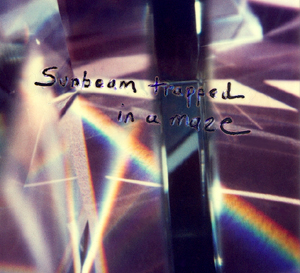
Sunbeam trapped in a maze © 2003 by María DeGuzmán from Prismatic Prismatricks You know, it's true. Vibrations in the air came to me from afar. This was to be our pyrotechnic, synaesthetic swan song. Such a beautiful last ditch-effort. But, I've always been a sucker for beauty. How strange that it involved the fracturing of light, a covenant displayed at its very undoing.
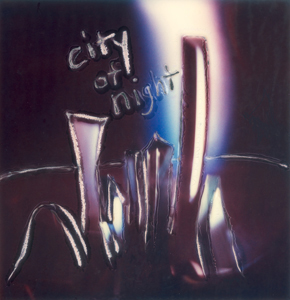
In the obsidian mirror © 2003 by María DeGuzmán from Prismatic Prismatricks
"In ancient times the Mexican Indians made mirrors of volcanic glass known as obsidian. Seers would gaze into a mirror until they fell into a trance. Within the black, glossy surface, they saw clouds of smoke which would part to reveal a vision concerning the future of the tribe and the will of the gods." --Gloria Anzaldúa, "Enfrentamientos con el alma" in Borderlands: La Frontera (1987)
pass over with cursor Of mourning and militancy © 2003 by María DeGuzmán
Ryder in the Eye of the Beast © 2003 by María DeGuzmán with the collaboration of Hadji
Boca con una rosa © 2003 by María DeGuzmán
Garçon, what's with the tux? Tux for a wedding, tux for a funeral © 2003 by María DeGuzmán
"In the flâneur, the intelligentsia sets foot in the market place— ostensibly to look around, but in truth to find a buyer." --Walter Benjamin, "Paris, the Capital of the Nineteenth Century"
Atlantis © 2003 by María DeGuzmán
Fountain of her being © 2003 by María DeGuzmán
"All seemed transparent for a moment to the gaze of Fanny Wilmot, as if looking through Miss Craye, she saw the very fountain of her being spurt up in pure, silver drops." --Virginia Woolf, "Slater's Pins Have No Points"
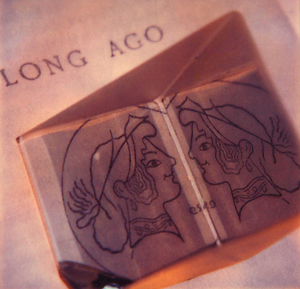
Long Ago Double Sappho for Katherine Bradley and Edith Cooper (aka Michael Field) from Prismatic Prismatricks © 2003 by María DeGuzmán
Ring fingers from Prismatic Prismatricks © 2004 by María DeGuzmán "Art thou so glad the sardonyx Becomes thy shapely hand?" From "Long Ago XXXV" by Michael Field
A "Y" is an "X" that diverges from
itself.
"The addict is a non-renouncer par excellence ... ." Avital Ronell, Crack Wars: Literature Addiction Mania (2004) |
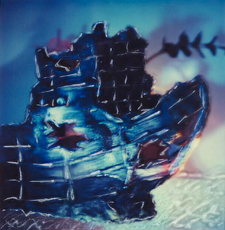
Floating Ruin © 2004 by María DeGuzmán Listing from side to side between inevitability and possibility...
Announced on the news today. The next big trend: foreclosure. Hard times. Someone's admitting it. Abandoned properties in disrepair full of garbage, rotting food, and missing light fixtures. Lack and loss. Loss and lack. Literally. Materially. Psychically, too, of course, for how can one separate any of these things? Melancholia and mourning vie with one another. Some say melancholia is endless while mourning is finite. Some say melancholia is a malingerer while mourning has a job to do and does it well. Mourning has a work ethic and melancholia is a bum. Or so some say. Read Freud's essay on mourning and melancholia and you too can join the fracas and take sides, if you wish, while one thing and another is fore- closed in a world of haves and have nots and happiness comes in pill form and sheer terror lies in an optimism that insists it has nothing to lose and everything to gain--that nothing much has been lost. That loss and lack can be defied with the right touch, the ethical equivalent of the Midas touch. "Opportunity world," a friend once said. For a while now she had been walking the decks of a becalmed and ruined ship. People kept waving to her and calling out, "Hey, get off that sinking ship and go cruising, girl. Enough is enough." She waved back and continued her vigil. There was much to see and trace. A tremendous amount. Her lost lover's face for instance. Bits of their past together. Her friends, missing in action. Last night in her dream, a dead friend came to dinner. There he was, sitting in her livingroom. She could see him very clearly, but he was also transparent. Just like a ghost. Just like the convention of a ghost. Another friend, a dying one, stopped by. In her dream she had become so small she had to get down on the floor to converse with her, to hear what she was saying. Just as in Alice in Wonderland. Toward the end of the dream, her lost lover appeared, as often happened at the end of dreams. She too was transparent and darkly so, a shadow it seemed, flitting about the house, the ship, the foreclosuring structure she refused to foreclose floating upon the waters. |
Regard © 2004 by María DeGuzmán
"As a passionate erotic glance desires its object, anxiety looks at sorrow in order to desire it. As a quiet, incorruptible glance of love is preoccupied with the beloved object, anxiety preoccupies itself with sorrow." -- Kierkegaard, Either/Or: A Fragment of Life (1843)
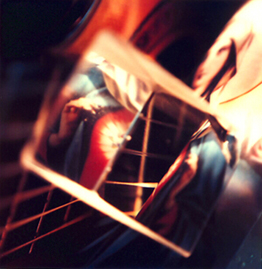
Opening, or Crystallization © 2004 by María DeGuzmán from Prismatic Prismatricks
This may look and sound like falling in love. But, in reality, it is a fugue state ...
Volatilize © 2004 by María DeGuzmán "Night falls like fire; the heavy lights run low, And as they drop, my blood and body so Shake as the flame shakes, full of days and hours" --Algernon Charles Swinburne, from "Laus Veneris"
Rushing flow of light through the dark places, silent annunciation of that which cannot entirely speak its name even if it tried within ephemeris time. This communiqué that permeates everything despite the dead space, the silence and white noise, the terror, the boredom and betrayals, the closing doors of possibility and the closed doors of perception, the flow of oil and blood that brings nothing but smog and despair, the killing fields and burning lakes, all the mutilations here and there. Rushing flow of light beyond good and evil, acceptance and rejection, horizons and prison bars. Rushing flow of light--an ecstasy, a drunken-reeling, an ineffable delight, and an unreconciled swift-moving sorrow for so much beauty in this place of fear and pain and restriction. |
Spirit Guide © 2004 by María DeGuzmán
Somebody said spirit guide. Concentrate now. The animal moving in the field stilled itself, face turned toward you. One of the mares who broke away from the nightmares, for a while anyway. What word casts a spell to stop time or make it go in circles of ecstasy, outside ourselves and shimmering in that space between? Something in another tongue, unknown to us but floating on the downwind. |
Treading Light: Fluxed © 2004 by María DeGuzmán
"You silly, desperate dreamer. You idealist," she reproached herself. "You of the cities of night and the night lights; the street signs invested with significance; the desire for a lost silken shoulder and the fallible human love for a fascinating jigsaw puzzle; the glimpse of an angel and those angelic conversations (when they were angelic); the play of light on reflecting surfaces; the galloping night horses of ghostly visions; the telescopes and binoculars and cameras and magnifying lenses with which to see more and more and more; the rainbow-making prisms of glass and water; the veil and sequin masquerades; the shadows that you chase; the full moon; the sun between your fingers; the searcher's swinging lantern; the skies aflame and the tracery of bridges burned; the grief-induced travel within a space-time warp; the queendoms, divadoms, on the rocks; the plays on perspective (a new angle, please); the hankering for eternity and perfection (oh, no!); and the rude, exhausted awakening to finitude and failure. The party's over, you overreacher." Alien Self © 2005 by María DeGuzmán Now all that's solid has melted into air. Someone dragged our idealism through smouldering landfills. Who has done this thing? (Oh, will you stop lamenting!) Hegel lies bound and gagged. The zeitgeist is system-wide spoilage. I heard a rumor ... someone said that someone said you told ... an untruth to singe the soul, for convenience and efficiency, because it is easier to forget and feel no more. I stand at the window, sentinel who refuses cynicism as a second skin or as protection, the protection of the refrigerated morgue vault. Some claim the world has become a manipulable play of surfaces and effects and unreconcilable fragments. Who can deny that? And yet pulling the rug from beneath certainty's feet has gotten old -- a trick without a tale to tell that reaches into the depths of the alienation to which we have sunk or risen beyond the earth's thin rind of breathable atmosphere. The picture of estranged recognition begins in the mirror turned inside out. |
Grand avenue of los sueños...
when you've lost your dream,
take a ride
into la noche
and read the signs of the times.
Check this out, for instance: www.politicalgraphics.org
| Welcome,
bienvenidos, to www.cameraquery.com or Camera
Query brought into existence summer 2003.
Camera Query was conceived and is designed and managed by María
DeGuzmán formerly of SPIR: Conceptual Photography at http://home.earthlink.net/~mdeguzman.
As the name Camera Query suggests, this project and entity practices its photo-text work to pose questions about reality, identity, identification, subjectivity, and agency in time and space. It approaches photography as conceptual performance (visual practice as applied theory) and views the play between visual and verbal signs as media for philosophical and political exploration and production. As you will see for yourself, this is a multi-issue site deliberately inter-relating musings on location, movement, stasis, appearance, affect (especially melancholia, wistfulness, and whimsy, though shock, grief, and joy, too), memory, projective imaginings, belief, desire, materiality, dematerialization, virtual materiality, spectrality, phantasmagoria, the politics of identity and identification, subjectivity and the uses of visual media (photography in particular, but also the web page itself, hypertext), and so on. Such an assemblage may seem confusing at first. This site is not laid out on the minimalist tabular genealogical tree-like basis generally encouraged in web design. Instead, it invites you to read areas of the page in relation to other areas, somewhat simultaneously, while scrolling up and down and side to side without having to leave this page if you do not want to, though there is plenty of opportunity to do so through the links. Think of it as the reading of an illuminated manuscript and/or emblem book, the digitalization of very old traditions of vision, interpretation, inquiry, and speculation, if you wish. This photo-text website is indeed an example of conceptual photography. Though much conceptual photography follows a minimalist aesthetic and minimalist praxis may be a way of questioning and deconstructing the very status of the "art object," not all conceptual photography is or must be minimalist by any means. Clearly, this page is not. It is neither minimalist nor "modern" but rather revels in the baroque and what might be taken as anachronistic, even "old-fashioned." But, those of you who contemplate the strange workings of (un)consciousness in space-time know that the avant garde often prepares us for what is to come and that what is to come is composed of broken fragments of history's déjà vu (paramnesia) spirallings! If we're feeling vertigo, is it any wonder?
Street of Thought/Deep Thought/Speculation The European Graduate School Speculative philosophy and the interpretation (construction?) of experience And, yes, for those of you who were wondering about the moniker Camera Query, it is supposed to be evocative—visually and aurally—not only of "querying" as in "questioning" but also as in "queerying," or making "queer" in all senses of that word, including the libidinal. "Queer" as sensibility and practice calls into question and toes a highwire strand plaited from (among other attributes) the impish (from the mildly mischievous to seriously bad attitude), the ecstatic, and the urgently grave. Enjoy.
To redeem the hopes of a demolished past, of a future soon obliterated?
PROGRESSIVE ART in general:
ELIN O'HARA SLAVICK "Hell has to do with justice,
"Satirists as disappointed romantics do not deal well with irrational fantasy because they recognize it as the path to disillusionment."--Patricia Juliana Smith, October 2003
I dreamt Brother Blue sang, "Why did you ...?" © 2003 by María DeGuzmán In her ear Brother Blue's song began and ceased and began again with tremulous cadence slow, dragging out an eternal note of sadness, comingling with other verses of Sappho and Sophocles and whatever else came in on the riptide of a faithless sea churned up by one more lady from the sea,
Lady © 2003 by María DeGuzmán one more of those huracanes (when did the eddy become a hurricane?) driven east to west and south to north, those whirling vortices que nos hacen saber que este mundo que aparenta ser tan varioso, tan bello, tan nuevo posee ni certidumbre, ni paz, ni bálsamo para el dolor. Temptation comes in many forms—masquerading as the angel of light, the arc of promise, the art of persuasion, the manufacture of identities, the tympanic sympathy of voices vibrating in unison while their purpose is singular—to shoot a ghost with a gun, abolish the specter whose heart began to break long ago. Specter with a heart of glass and eyes wide open, an anti-type of Oedipa standing before the riddles of the Sphinx, blinding herself as long as she could but foreseeing into the distance how the dice would fall, the wheels of opportunity turn. Such turns of the wheel are predictably confused by sleepwalkers with lines of escape and the fantastic (or are they infernal?) desiring-machines of which the poet-philosophers speak. Oedipa's anti-type sighs sharply as she recognizes the wellworn pleasures of pre-programmed elopement, over hill and dale, mistaken for resistance and rebellion, mistaken for a radical politics of desire. An accident. Desire is an accident. It does not know itself. A derailment, if this were a train wreck. But it was a car accident. Machinic limbs. Limbic machines. Libido is a machine. Watch what you set in motion, riding in what drives you. pass over with cursor Had a ticket to ride, or
too "unreal" for fiction
© 2003 by María DeGuzmán
("love is a Stranger
in an open car
to tempt you in
and drive you far away"--Eurythmics)
AUTO-BIO-PHOTO/EXPERIMENTS Collected Visions The Mirror Project Duane Michals
What the night mares saw © 2003 by María DeGuzmán
"Sweet dreams are made of this … everybody is looking for something" (but will Senta choose the Farm instead?) © 2003 by María DeGuzmán in collaboration with Martha Mockus and Patricia Juliana Smith
"To the sea, back to the sea! To the sea for all eternity! You have broken faith, I cannot be saved!" © 2003 by María DeGuzmán in collaboration with Patricia Juliana Smith
Joy and Grief "That grief should be willingly endured, though far from a simply pleasing sensation, is not so difficult to be understood. It is the nature of grief to keep its object perpetually in its eye, to present it in its most pleasurable views, to repeat all the circumstances that attend it, even to the last minuteness ... ." --Edmund Burke, A Philosophical Enquiry into the Origin of our Ideas of the Sublime and the Beautiful (1757)
Listening © 2003 by María DeGuzmán She felt herself beginning to turn a corner. She knew she could not live on the spiritual anemia of melancholic nostalgia -- a la recherche du temps perdu. Nor would she die of it, though it was wasting the flesh off her bones, literally, as if giving so much thought to feeling, feeling to thought, were sucking out the very marrow. She cupped her hand to rest her chin, facing, with eyes open but inward-looking, the vertiginous despair she had been fighting through denial. Despair. There it was. There it was. And there it was again. Every instant. She would not try to annihilate it. She sat listening, breathing. The world was often raunchy and raucous, full of cheap thrills and short-lived betrayals and venganzas. She considered it might be time to laugh, just a little. But she also knew it would be a laugh tentatively edged with an aureole of terror, rings of color around the moon.
Samples from a A Hard Day's Nightwood, after Djuna Barnes's novel Nightwood (1936) Done with the collaboration of
Erin Carlston, Hadji, Carisa Showden, and Patricia Juliana Smith
as well as Dominique Fisher, Frederica von Jagen, Candace Jean
Kern, Annie Martin, Steven P. Preissler, Brian Toomey, Matthew
and Susan Townsend, and with the cooperation of Acme Food and
Beverage Co., Charron Andrews, and the Kern Residence "'Doctor, I have come to ask you to tell me everything you know about the night.'" --Djuna Barnes
"Ah, mighty uncertainty!" said the doctor. "Have you thought of all the doors that shut at night and opened again? ... and all the windows, great and small, from which love and fear have peered, shining and in tears." pass over with cursor Carisa as Nora searching for Robin ©2003 by María DeGuzmán
"... seeing Robin go from table to table, from drink to drink, from person to person ... ." --Djuna Barnes pass over with cursor Robin and "the Other Woman" Exponential © 2003 by María DeGuzmán "... looking out into the garden ... she saw a double shadow falling from the statue ... she saw emerge from the darkness the light of Robin's eyes ... Robin's eyes met hers." -- Djuna Barnes pass over with cursor Erin as Jenny Petherbridge © 2003 by María DeGuzmán Café de la Mairie du VI © 2004
by María DeGuzmán with the collaboration of Patricia
Juliana Smith, Steven P. Preissler, Dominique Fisher, Carisa Showden,
Erin Carlston, Candace Jean Kern, Annie Martin, Brian Toomey,
and Acme
Signifying: Endgame © 2003 by María DeGuzmán
Claude Cahun Ear © 2004 by María DeGuzmán
Oh, no, not another no exit play.
Wouldn't a little intercession be nice? © 2004 by María DeGuzmán from Prismatic Prismatricks
A queer clairvoyance (in memory of Michael Field) © 2004 by María DeGuzmán from Prismatic Prismatricks Here s(he) comes, an angel of joy, over the red purgatorial fields towards the bluest depths of water living
Minerva's Radar © 2004 by María DeGuzmán
¡Flaming O! © 2004 by María DeGuzmán
Thunderhead. © 2004 by María DeGuzmán
Wrong Way © 2003 by María DeGuzmán
Gnosis of the bridge © 2004 by María DeGuzmán
Synchromos, or Affinity © 2005 by María DeGuzmán with the collaboration of Ishtar
|
"My
soul has lost possibility.Were I to wish for anything I would
not wish for wealth and power, but for the passion of the possible,
that eye which everywhere, ever young, ever burning, sees possibility.
Pleasure disappoints, not possibility." --Kierkegaard, Either/Or:
A Fragment of Life
Crossroads © 2003 by María DeGuzmán "Fidelity gave a unity to lives that would otherwise splinter into thousands of split-second impressions." -- Milan Kundera, The Unbearable Lightness of Being
Pieces of the Puzzle © 2003 by María DeGuzmán All the pieces are in place except for Hex and Why, two characters out of an unfinished mystery novel in which past-life narratives take over the protagonists, narratives sensed obliquely in the form of hunches, dreams, amd premonitions. Or was it merely instrumental rationality that unhitched Hex from Why?
Reality fantasy, or fake it to make it (gracias, EC) © 2003 by María DeGuzmán WHAT DO WE WANT TO BUILD, ANYWAY? JUBILEE ARTS is now THE PUBLIC, Birmingham, England www.thepublic.com promoting socially engaged public art exploring homelessness, questions of internet access, etc. "Dreamers, thinkers, doers, lookers"-- "Developing Forms of Democratic Evaluation" article by Roz Hall, UK Those beguiling eyes will always contain a question about a sense of an ending, like double question marks, like hovering fish hooks luring one on... Here's looking at you, kid, or throw me a life (line) © 2003 by María DeGuzmán Persona: the I one chooses to remember or this is not an eye © 2003 by María DeGuzmán I was at a party the other night and someone said, "Hey, did you know there was this nineteenth-century tradition of wearing the eye of your beloved on your lapel in the form of a combination pin-and-locket? Behind the eye, inside the locket, would be a miniature portrait of your loved one." And someone else replied, "The eye of love; not the evil eye." Now we all know the the future cannot be divorced from the past, nor the past from the future and that both are resistant to our deepest dreams and desires for wish-fulfillment. They cannot be divorced, but the time is nevertheless out of joint and suffused with the shock of being out of joint, verging on something other than where you are now. You wake up each day or night (depending on your shift) with the pressure of both the past and the future on your fluttering eyelids--usted sabe, ese peso, esa presión, sobre los párpados. And in that moment of coming up out of the dream-- and here I mean a dream of being in the remembered arms of someone who has left you (deliberately or accidentally) or being within reach of something you wanted and never got or lost--well, you know how it is, don't you, that sinking, sickening feeling because your geophysical and psychic time-spaces have broken apart, are dis-integrated, and you say to yourself, no you just feel these words: I don't get it. No entiendo. And you long for an understanding with a live person who is as good as dead. And you are, therefore, haunted by the past body, soul, and spirit of one who is still alive and yet to whom you are dead. And you are now yourself both living and dead, a revenant. But, revenant or not, you must rise from your bed anyway, if you can, and go out into the world, walk the face of this planet spinning in space. Spining, spinning, spinning faster and faster around the sun (new evidence shows), and labor in the world and also labor so that you can work with some satisfaction--increasingly difficult with growing poverty levels, oxygen restriction, and dwindling water tables or too much water but not a drop safe to drink (to name just a few challenges facing the majority of us now and in the future).
Sitting on an iceflow, one's world oddly transparent,
one's heart glacial as the polar caps melting under the eye to
the sky in the ozone, while people run, walk, sit, stand, stare,
looking for something when not merely surviving. And in the looking
is the despair, isn't it? Because whatever it is you find is hardly
what it seems, is hardly solid, but melting into air and water,
and blood and sweat and tears. Tears blurring the signs there
to guide you or confuse you or both. And, so now you close your
eyes and you'd like to be done with secrets and signs, with shadows
and light, with the cryptic and the clear, encoded emotions, but
the next breath finds you looking again with a "useless"
passion for a refraction, a bending of the light, in the heavy
medium of concealment between us.
Mediating Obsolescence MirrorShades Postmodern Archive
Philosophy
Photography Photography: A Mediatheoretical Approach
Visual Stories, Phototextuality, etc. The Aesthetics of Audiovisual Stories
Visuality/Virtual Space/Remote Presence
The Cave (Plato, Plato, and more Plato) Franklin Furnace and Avant-Garde Art on the Internet Mediamatic (On Paul Virilio and new technologies) Virtual Reality Application Center
Visual Culture Department of Visual Arts, UC San Diego Visual Arts Glossary (Classical Antiquity to Postmodernity) Visual Culture: Theory, Practice, Pedagogy World Arts and Cultures Dictionary
Visualization & Cognition
Color
Visión a ciegas (Blind vision), or life-game of statues © 2003 by María DeGuzmán
Bomber or butterfly? Which shall it be? © 2003 by María DeGuzmán TRYING TO MAKE JUSTICE, NOT WAR http://moveon.org http://www.unitedforpeace.org http://www.occupationwatch.org http://www.bringthemhomenow.org http://www.space4peace.org One World España Cultura contra la guerra Take back the media
Rat and pig race while the world dries up ...panic!: Under the sign of Mars © 2003 by María DeGuzmán
Horns of a dilemma © 2003 by María DeGuzmán in collaboration with José Ramirez
pass over with cursor The Black Widow of the Red Bride or the Apparition of the Opera © 2003 by María DeGuzmán in collaboration with Yoko
pass over with cursor Faustina, her assistant, and the devil: to show thee what magic can perform © 2003 by María DeGuzmán in collaboration with Theresa Hanson, Corinne Blackmer, and Patricia Juliana Smith
Okay, okay. Let's talk about the medium's power to haunt and to deceive— ghost images all. What does it mean to split the ghost from the living body, to contemplate a virtual presence over a "real" one, to lose ourselves so among the shapes, colors, and shades that stimulate the retinal cones, the optic nerves, but not other nerve endings? A curious sort of "nerve bible," wouldn't you say?
"Some time later, if one can speak here of time at all, it became clear that after death human thought lives on by momentum." --Vladimir Nabokov, The Eye (1965)
"I feel that strong emotion must leave its trace; and it is only a question of discovering how we can get ourselves again attached to it, so that we shall be able to live our lives through from the start." --Virginia Woolf, "A Sketch of the Past" (1940)
Lone Light after Gaslight © 2003 by María DeGuzmán pass over with cursor Hey, have you ever been gaslighted? After that you may derive consolation from the movements of clouds across the sky, ah the big sky as the singer sings, and the drum still beating in your chest ...
Red sky at mo(u)rning © 2004 by María DeGuzmán with the collaboration of Yoko
Stroll on the Planes © 2004 by María DeGuzmán from Prismatic Prismatricks "Her influence is over you, though she have no existence but in that momentary image. ... You stand in the sunny rain of a summer shower, and wander among the sunny trees of an autumnal wood, and look upward at the brightest of all rainbows ... ." --Nathaniel Hawthorne, "The Haunted Mind"
"Every angel is terrible. And yet, alas, I welcome you, almost fatal birds of the soul, knowing about you." -- From "The Second Elegy," in Rainer Maria Rilke's Duino Elegies (1922) Of wings, sails, and the ghost of bridges burned © 2004 by María DeGuzmán
Dutch Remastered © 2004 by María DeGuzmán
Wild West Palimpsest © 2005 by María DeGuzmán
The Pig King's Vision © 2005 by María DeGuzmán
|


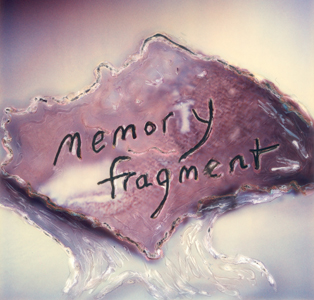
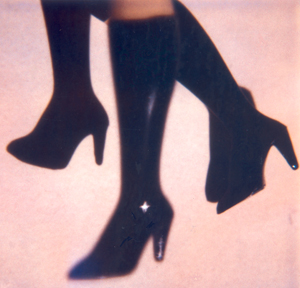
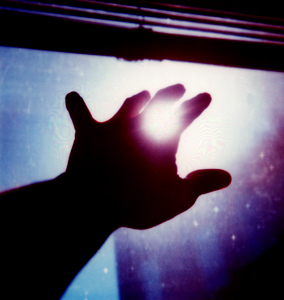
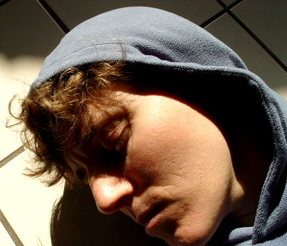
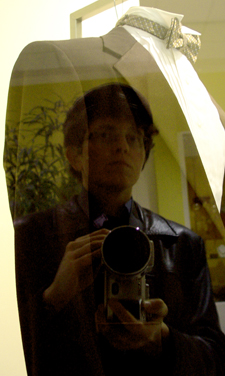
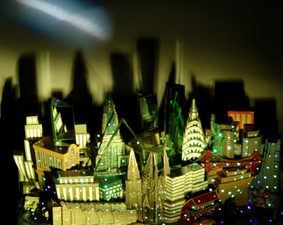

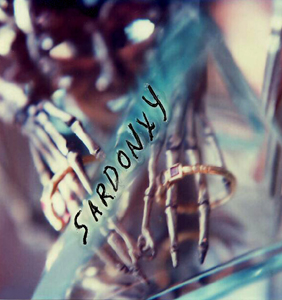
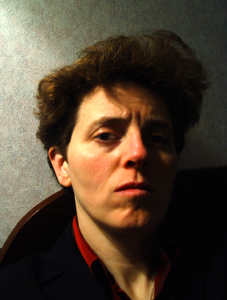
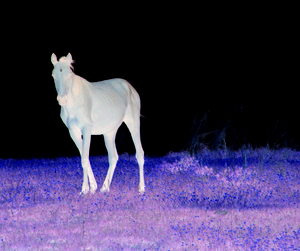
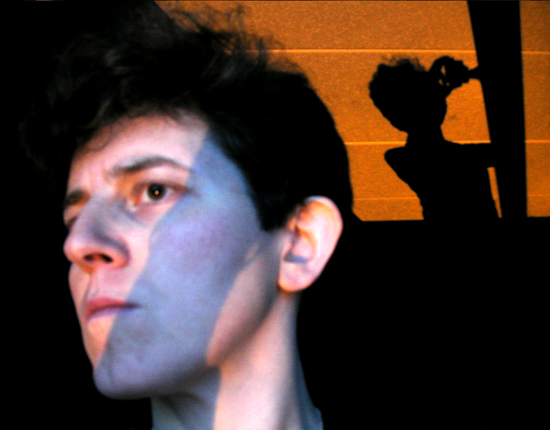
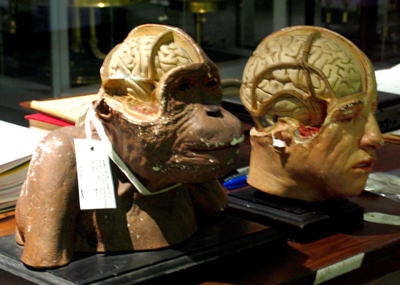
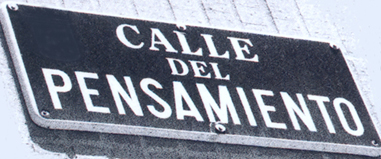


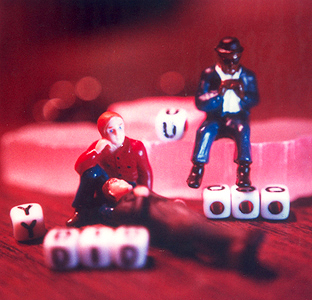


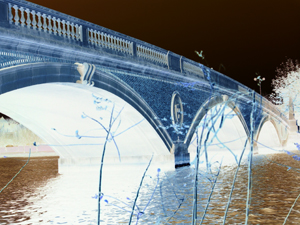


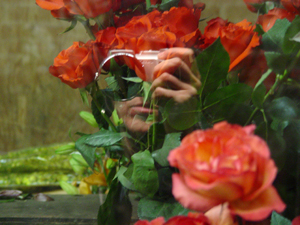
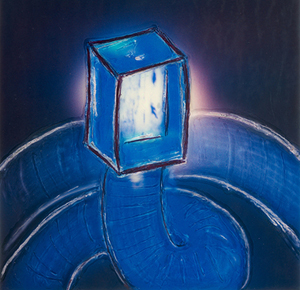
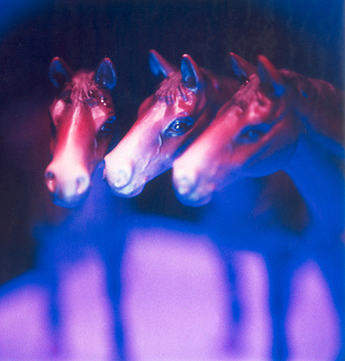
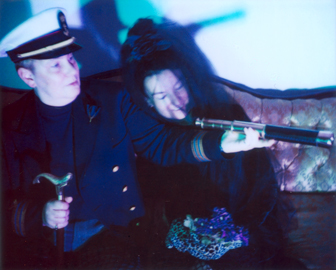
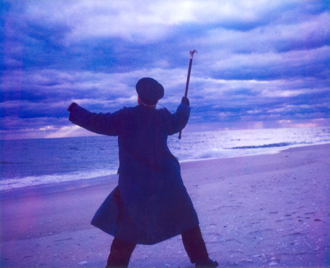

 Moon caught on a branch:
We're going there, haven't you heard?
© 2003 by Maria DeGuzmán
Moon caught on a branch:
We're going there, haven't you heard?
© 2003 by Maria DeGuzmán
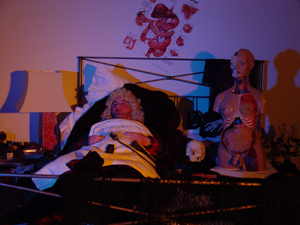
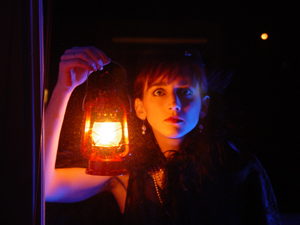
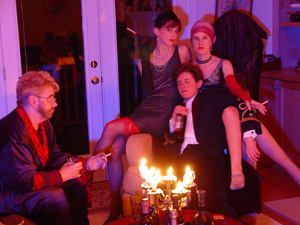
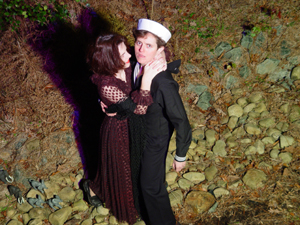
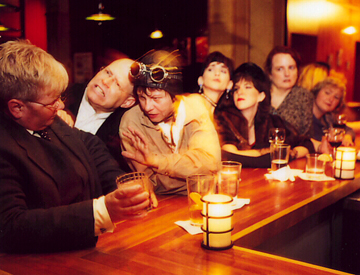
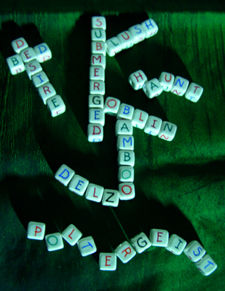

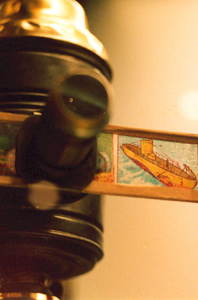
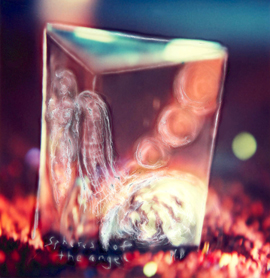
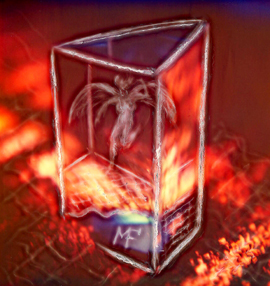
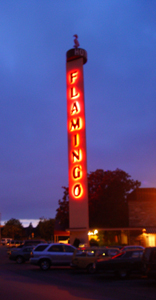
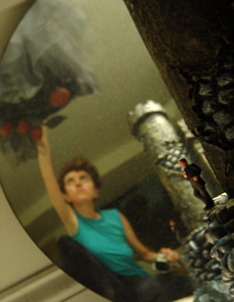


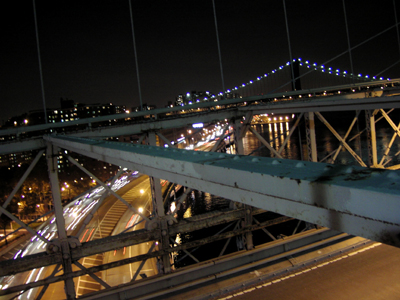
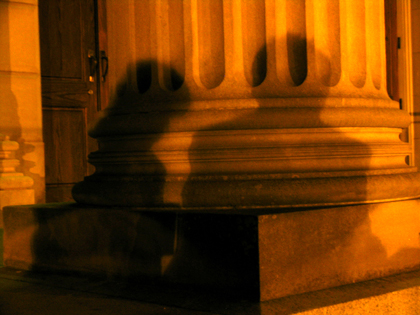
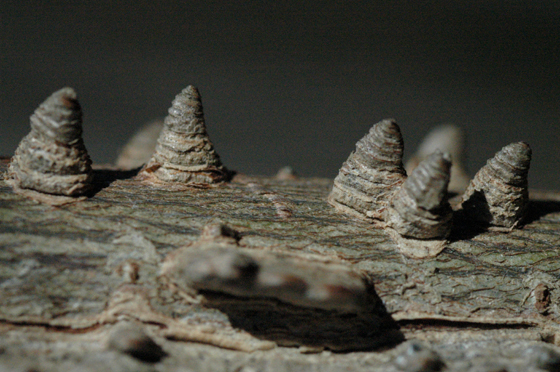

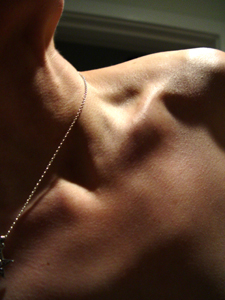 Face on Your Shoulder: Anamorphosis
© 2004 by María DeGuzmán
Face on Your Shoulder: Anamorphosis
© 2004 by María DeGuzmán
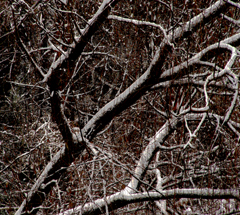 Y © 2004 by María DeGuzmán
According to instrumental rationality,
everything has a value and, above all,
a use, a usefulness to the evaluating eye.
When faced with a dilemma, this is how you
choose between A and B or Y and Z, though no
reason to suppose those variables need
to be represented by contiguous letters.
Then again, is this a wall?
And what happens to all those walled off
memories, expectations, attachments?
Do these become dis-integrated pieces,
sharp-edged fragments?
Rubble, brittle and brash?
Y © 2004 by María DeGuzmán
According to instrumental rationality,
everything has a value and, above all,
a use, a usefulness to the evaluating eye.
When faced with a dilemma, this is how you
choose between A and B or Y and Z, though no
reason to suppose those variables need
to be represented by contiguous letters.
Then again, is this a wall?
And what happens to all those walled off
memories, expectations, attachments?
Do these become dis-integrated pieces,
sharp-edged fragments?
Rubble, brittle and brash?
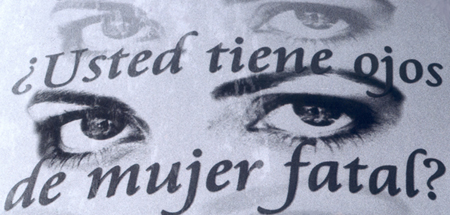

 Temple of Thought © 2004 by
María DeGuzmán
Temple of Thought © 2004 by
María DeGuzmán
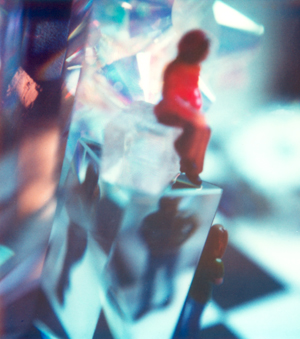
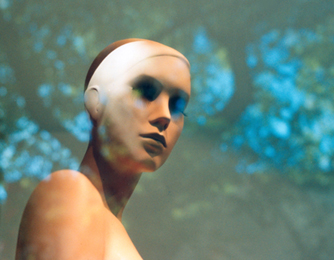
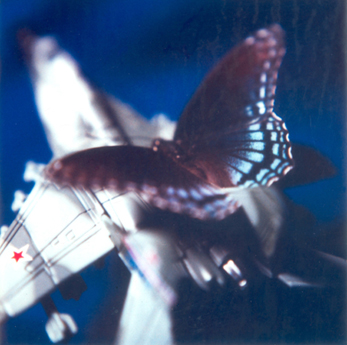
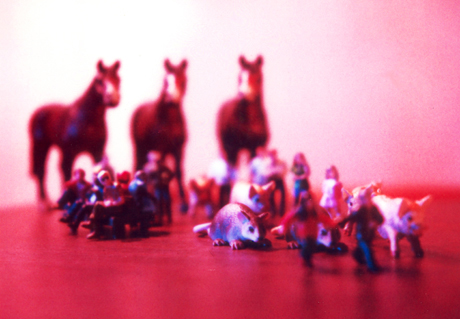

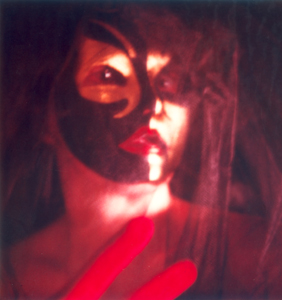
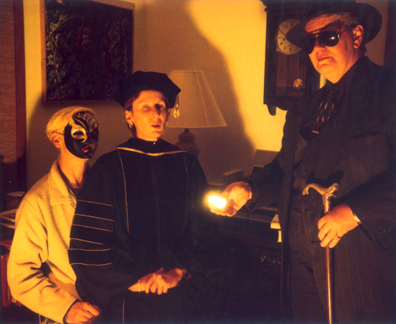
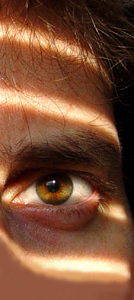


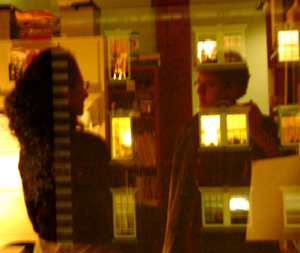
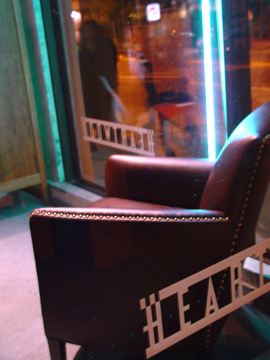
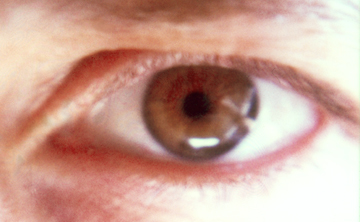
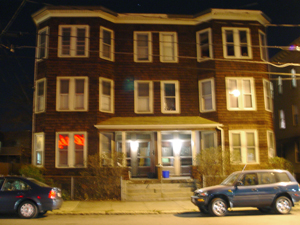
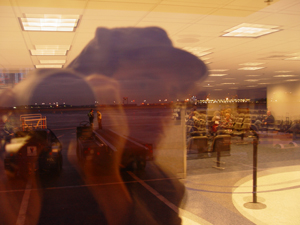
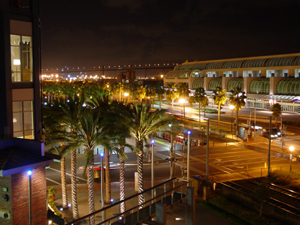
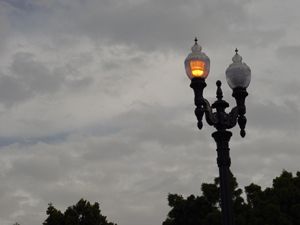
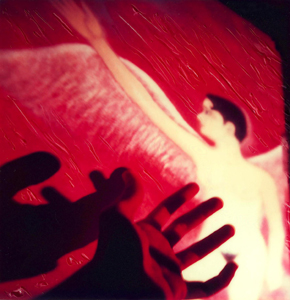
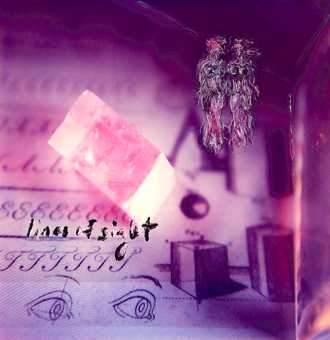
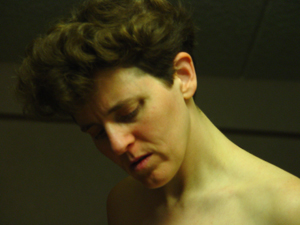
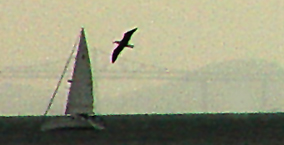
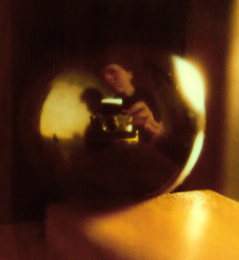
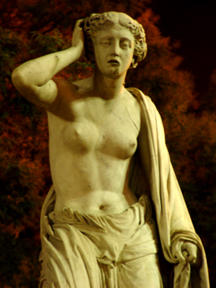 Undone © 2004 by María DeGuzmán
Undone © 2004 by María DeGuzmán